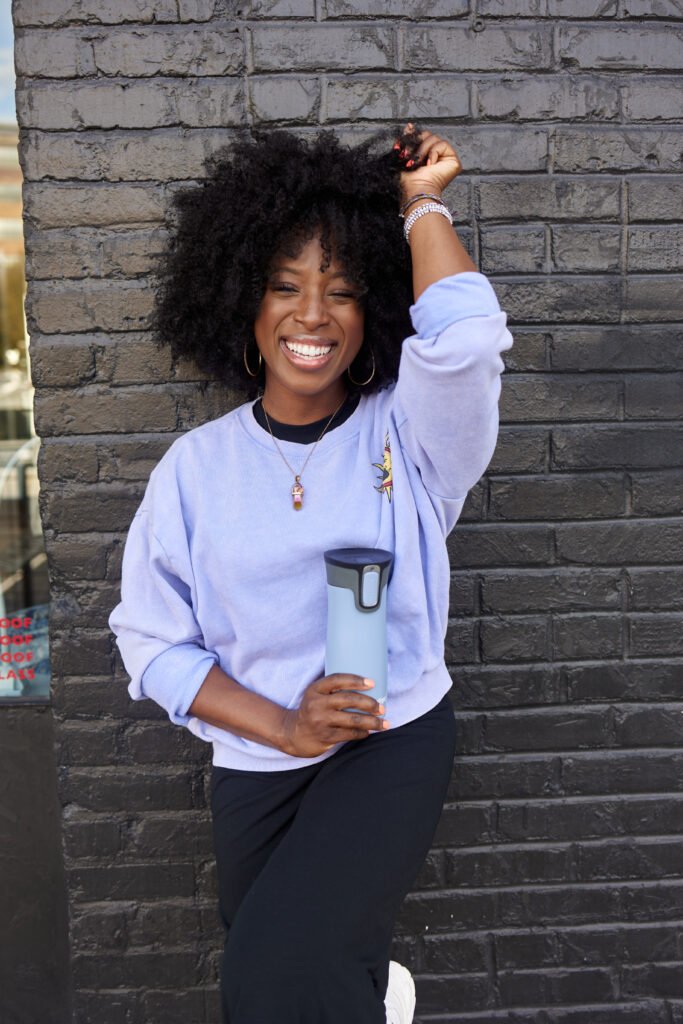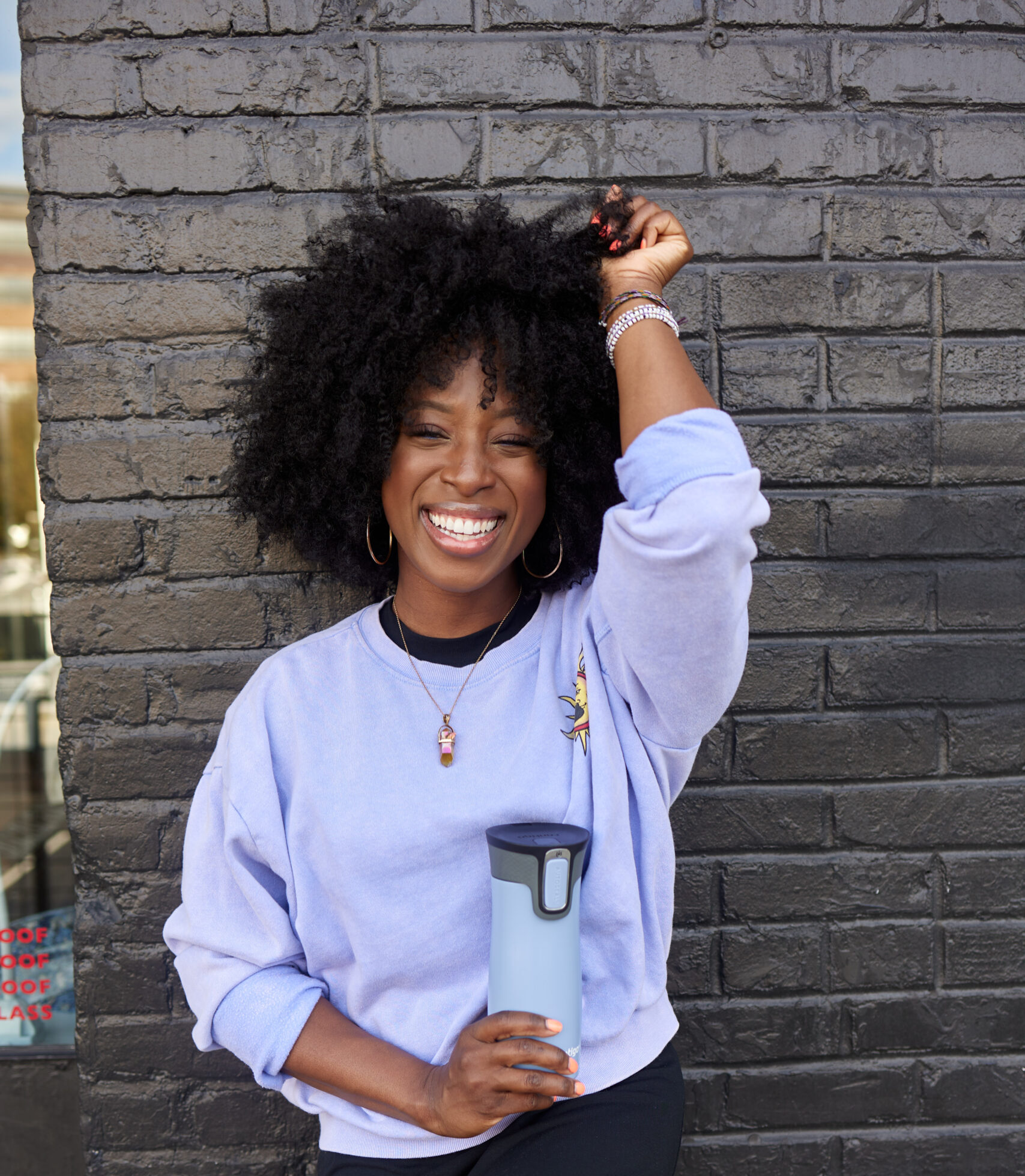I always try to essentially test everything out in business. Just so I’m not someone who’s just like talking the talk and telling everybody else what to do, but to see what it actually feels like to do these things and to see what is profitable and to actually experience that.
Olamide Michelle is done with cookie-cutter business advice.
“We are all living very unique lives and we have our own interesting personalities and distinctive business talent,” she told Magnify CEO and Founder Julia Lumpkin on Instagram Live. “I like to consult with my clients in a way that actually suits their lifestyle, their interests, and really what they’re best at so that they can find a way to build successful businesses and brands with ease.”
In this article, you’ll learn…
- Olamide’s journey to finding a cross section between business consulting and practicing law
- Approaching success holistically
- Defining a scalable business and the keys to building one
- Business mistakes to avoid
- Creating a work flow that works best for you and your lifestyle
Creating a new practice.
Olamide is the founder of The Boho Business Guide, her solution to providing realistic business resources and one-on-one support to business owners, big and small. She has almost a decade of experience in consulting business owners, though not in the way you’d expect: Michelle is a lawyer, first and foremost.

“Turns out I actually like practicing law, so long as it’s in the space of entertainment and creativity. So, it works hand in hand that OMI Legal provides those services such as trademark protection and brand protection for digital brands.”
That’s right. Olamide is the founder of not one, but two companies: The Boho Business Guide and OMI Legal, which focuses on—as you guessed it—the legal side of business.
You are both a lawyer and a business consultant. Can you tell us a little bit about your journey to that pathway?
I mean, honestly, it’s why I do things the way I do it, because I felt like I was always conflicted.
At first, I was only leaning into coaching and consulting. I would see other people really thriving. They’d have hundreds of thousands of followers and it seemed like everybody was buying their services. And I feel really confident speaking on these subject matters to help professionals, entrepreneurs, things like that.
But it doesn’t seem like I should throw away my other skill set, which is law. And then, you know, after you’ve invested a lot of time and money becoming a lawyer, you know, you might as well utilize the skills.
So I’ve dabbled with combining all of these elements into my brand, separating them. I’m really interested in both areas of business and they work hand in hand to essentially guide entrepreneurs to a well-rounded, supported experience.
Across all of your brands, you talk about success from a holistic approach. Could you expand on what that means?
What I try to make my niche is that whole bohemian unconventional way to success, and that means looking at things holistically. So if that means I need to do a workshop on mindset, it’s not just about “kumbaya,” you know, positive vibes and sending you good energy. It’s deeper than that.
It’s understanding like what are your roadblocks? Are you someone who’s really horrible at time management and you need to hire an assistant? Maybe all of your money, your discretional income to go into your business, goes into someone to hold you accountable. It goes into applications designed to actually help you stay organized and feel a little bit more structured in your day-to-day life.

Amazing, and for the focus of our conversation: What does it mean to you to have a scalable brand?
Scalability can mean a lot of things.
I think at first we really need to define it fundamentally: to scale is essentially to grow. Now you can scale and grow just like in anything, multiple ways. So you can think about it like you’re scaling vertically or horizontal.
Vertical, it’s like: Oh, I’m growing, I’m making more money, I’m more visible, I have more followers. And then it just keeps expanding. But you’re still within the same scope.
Horizontal scalability would be: you’re expanding the offering, expanding the experiences, expanding the potential for transformation with your ideal client and customer. And that means you might be diversifying your products and services.
It doesn’t mean you’re working harder, or like reinventing the wheel. But you might be converting some of your offerings into other formats, that way you can reach a different type of audience and then make money in a unique way.
Ideally, and what I personally want to do in my businesses, is to do both.
We’ve both been in business for a while now, so scaling makes sense. But why should new business owners, new entrepreneurs start thinking about scaling their brand now?
The main reason I would say is viability. Typically, when you’re in the business planning stage—that can be as early as three weeks or even three years, depending on the progress you’ve actually implemented—you want to think, is this even a good product? And product can mean service or it can mean a physical product.
And I don’t mean literally like, ‘Oh, I’ve created a really cute iPhone case.’ No, it means: Is there a need? That’s your first question, because you cannot grow something that cannot even exist on the basic level.
The next reason is that there are other areas of business such as the law. With trademark law, that you start to realize like, ‘Oh, I can protect my brand on a higher level and expand by creating this line of books and getting onto Amazon or into actual physical brick and mortar buildings. I didn’t really think about this ahead of time, but now I have to rebrand so my consumers understand that I’m the same business now offering these new things.’
Thinking ahead is going to be really crucial to your potential, not only for like the beauty of manifesting something magical for your business, but also just realistically so you have some structure and somewhat of a plan to work.

From your own experience working with business owners and entrepreneurs, what are some of the pitfalls or things that you’ve seen that happen because businesses weren’t scalable?
Burning out because you’re discouraged, because you’re not growing. We all get discouraged when we don’t do well at something. It’s hard to stick at things that don’t really work, or at least you don’t see that it’s working. Then you get really discouraged and stressed, and now you’ve wasted a lot of time and energy in the wrong space when people would’ve been more interested and more likely to invest in this other thing that still required the same type of skill set and energy from.
What are three things business owners and entrepreneurs should think about in making themselves scalable?
I’d say the first thing is de-stigmatizing having multiple jobs. The second thing is thinking, how can I have these alternative routes to the same destination? You should have a clear idea of what freedom looks like for you, what wealth and you know, success looks like for you, not for everybody else, but for you. And then C, are there other ways I can do this if Plan A or Product A doesn’t sell.
Lastly, what are your top three podcasts?
Actually, I’m not gonna name drop any specific ones because I listened to so many random podcasts. But I think the weird area or unique area that I’m obsessed with is like, anything mindful and not just mindful, but people who have witty personalities that are like dark humored and sarcastic, but talking about very important things.
Those tend to be my people. It could be like a spiritual podcast, but they’re just like super hilarious about everything. Or one was talking about the adult child and it was looking into the inner mind of things we are caring from our childhood that affect our productivity, our success, our confidence, our mindset when it comes to literally everything. And hearing these people tell their stories and give some wisdom, too, actually helps you in your daily life.
Connect with Olamide Michelle and learn more about her companies, The Boho Business Guide and OMILegal, by visiting their respective websites and following her on Instagram. Olamide also has a podcast you can listen to on all stream platforms.

